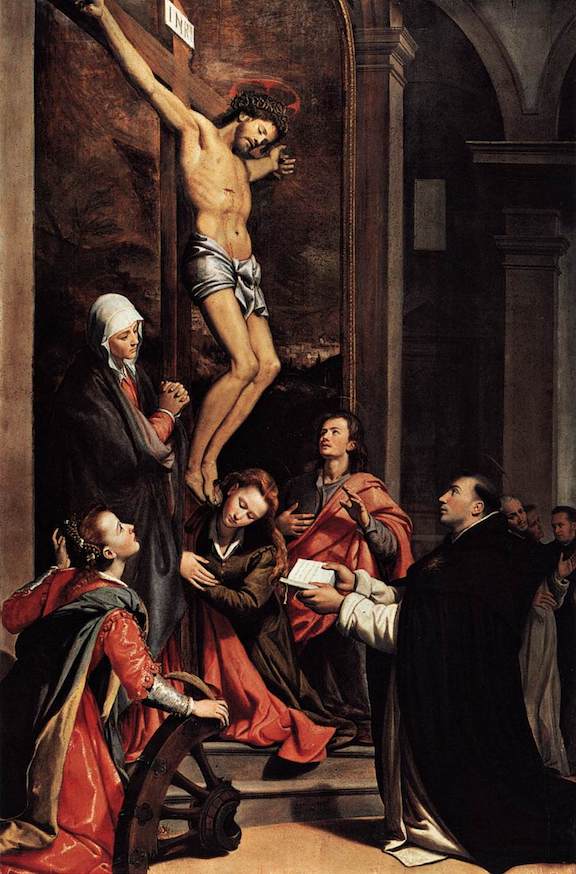There’s a radio station in Boston that promises “traffic on the threes.” A listener is assured that if he is driving in his car and can tune in for just ten minutes, then he will hear at least one traffic report.
The Church, which thinks in centuries, also has regular anniversaries on centenaries. So, a Catholic can be assured that, if he lives a hundred years, he will be blessed to witness the observance of these. Or sometimes it is just a matter of good fortune to be alive when one such centenary comes by.
And so it is this year, when the Church celebrates the 700th anniversary of the canonization of St. Thomas Aquinas. The date was actually yesterday, July 18th. But if you missed it, never fear, dear reader. The Dominican Order is celebrating a double jubilee year, which began yesterday and continues until the 800th anniversary of the saint’s birth on January 8, 2025. It understandably takes more than a day to celebrate eight hundred good years.
To affirm that celebration for the whole church, the Vatican is granting a plenary indulgence during this time to anyone who makes a pilgrimage to a church, chapel, or shrine connected to the Dominican Order for a jubilee celebration. But it also enough simply to spend some time in recollection there, and end by praying the Lord’s Prayer, reciting the Creed, and invoking the intercession of the Blessed Virgin Mary and St. Thomas Aquinas – assuming of course that the usual other conditions for an indulgence are met.
Most Catholics have heard of the encyclical letter of Pope Leo XIII, Aeterni Patris, which inspired a remarkable worldwide revival of Thomism. But one hundred years ago Pope Pius XI wrote what was, in some ways, an even more significant encyclical on St. Thomas Aquinas, Studiorum ducem (“Our Guide in Higher Studies”).
“It behooves the whole of Christendom worthily to celebrate this centenary,” that Pontiff percipiently commented, “because in honoring St. Thomas something greater is involved than the reputation of St. Thomas and that is the authority of the teaching Church.”

Pius accordingly made Rome the center of the celebrations, as “It is only proper that this Eternal City in which Aquinas was once master of the Sacred Palace should take the lead in holding [them].” He furthermore directed that each seminary or other institution for the education of priests should hold a public disputation in connection with the anniversary, “on some point of philosophy or other important branch of learning.”
He also appended to his encyclical the famous prayer of St. Thomas Ante studium (“Before studying”) so that, “the studies to which Our young people devote themselves may, under the patronage of Aquinas, daily yield more and more fruit for the glory of God and the Church.”
There are many fascinating lines in the encyclical. For instance, Pius praises St. Thomas’s holy purity, saying his “perfect regard for purity was accompanied at the same time by an equal aversion for fleeting possessions and a contempt for honors.” It turns out that this was the pope’s delicate way of referring to the incident when St. Thomas drove from his cell with a burning brand a woman sent there by his ambitious relatives, famously using the brand to burn a cross into the wooden door which closed behind her as she fled.
We are warned by Holy Scripture, Pius says, that “wisdom will not enter into a malicious soul, nor dwell in a body subject to sins.” (Wisdom 1:4). Then he speculates: “If the purity of Thomas therefore had failed in the extreme peril into which, as we have seen, it had fallen, it is very probable that the Church would never have had her Angelic Doctor.”
Indeed. Which might cause one to wonder how many doctors or saints who were meant to be present among us, and be guiding the Church now, simply do not exist, because they did fall, and holy wisdom left them then, never to return.
Pope Pius twice mentions with admiration St. Thomas’s practice of turning to prayer and fasting when he was grappling with an intellectual problem: “he would frequently fast, spend whole nights in prayer, lean his head in the fervor of his unaffected piety against the tabernacle containing the august Sacrament, constantly turn his eyes and mind in sorrow to the image of the crucified Jesus; and he confessed to his intimate friend St. Bonaventura that it was from that Book especially that he derived all his learning.”
I found it remarkable that the author of Quadragesimo anno says in effect that all of Catholic Social thought may be found in “those superb chapters in the second part of the Summa Theologica on paternal or domestic government, the lawful power of the State or the nation, natural and international law, peace and war, justice and property.”
Indeed, “If these precepts were religiously and inviolably observed in private life and public affairs, and in the duties of mutual obligation between nations, nothing else would be required to secure mankind that ‘peace of Christ in the Kingdom of Christ’ which the world so ardently longs for.”
Pius XI also quotes Pius X on St. Thomas as the teacher of Councils: “ever since the happy death of the Doctor, the Church has not held a single Council but he has been present at it with all the wealth of his doctrine” (Doctoris Angelici)
“A man can derive more profit in a year from his books than from pondering all his life the teaching of others,” commented Pope John XXII famously, not long after St. Thomas’s death. I calculate that there are 539 days in this Aquinas double jubilee. If you start today, and study a Question a day, then, God willing, you can nearly finish the whole Summa (consisting of 614 Questions) in that time.
What are you waiting for?
__________















